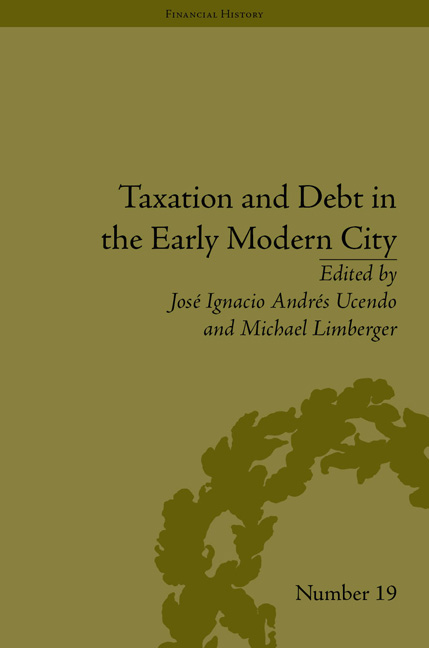Book contents
- Frontmatter
- CONTENTS
- Acknowledgements
- List of Contributors
- List of Figures and Tables
- Introduction
- 1 From Private to Public Management: Tax Farming and Customs Duties in Rome (1630–1700)
- 2 From Taxation to Indebtedness: The Urban Fiscal System of Milan during the Austrias Domination (1535–1706)
- 3 The Urban Tax System in the Kingdom of Naples (Seventeenth to Eighteenth Centuries)
- 4 Public Institutions, Local Politics and Urban Taxation in Seventeenth-Century Aragon
- 5 Taxation and Debt in the Early Modern Castilian Cities: The Case of Seventeenth-Century Madrid
- 6 Tax Collection in Spain in the Eighteenth Century: The Case of the ‘Décima’
- 7 Finances, the State and the Cities in France in the Eighteenth Century
- 8 The Making of the Urban Fiscal System of Antwerp until 1800: Excises, Annuities and Debt Management
- 9 The Dutch Financial System between Public and Private Interests: Urban Debt (1500–1700)
- 10 The Urban Fiscal System in the Habsburg Monarchy: The Case of the Austrian Hereditary Lands in the Sixteenth to Eighteenth Centuries
- 11 Taxation and Debt in Early Modern German Cities
- Notes
- Works Cited
- Index
5 - Taxation and Debt in the Early Modern Castilian Cities: The Case of Seventeenth-Century Madrid
- Frontmatter
- CONTENTS
- Acknowledgements
- List of Contributors
- List of Figures and Tables
- Introduction
- 1 From Private to Public Management: Tax Farming and Customs Duties in Rome (1630–1700)
- 2 From Taxation to Indebtedness: The Urban Fiscal System of Milan during the Austrias Domination (1535–1706)
- 3 The Urban Tax System in the Kingdom of Naples (Seventeenth to Eighteenth Centuries)
- 4 Public Institutions, Local Politics and Urban Taxation in Seventeenth-Century Aragon
- 5 Taxation and Debt in the Early Modern Castilian Cities: The Case of Seventeenth-Century Madrid
- 6 Tax Collection in Spain in the Eighteenth Century: The Case of the ‘Décima’
- 7 Finances, the State and the Cities in France in the Eighteenth Century
- 8 The Making of the Urban Fiscal System of Antwerp until 1800: Excises, Annuities and Debt Management
- 9 The Dutch Financial System between Public and Private Interests: Urban Debt (1500–1700)
- 10 The Urban Fiscal System in the Habsburg Monarchy: The Case of the Austrian Hereditary Lands in the Sixteenth to Eighteenth Centuries
- 11 Taxation and Debt in Early Modern German Cities
- Notes
- Works Cited
- Index
Summary
The evolution of the fiscal and financial systems set up by European towns during the early modern period was led by the interplay between local traditions and the process of state formation. Being key points for the accumulation of capital and wealth through trade and manufacture, the European states of the early modern period tended to increase the resources drawn from their towns by means of finance and taxation. The cities saw this development from an ambiguous perspective: on the one hand, the urban oligarchies looked with suspicion on the repercussions of state interference in their activities, but, on the other, they welcomed the protection for the expansion of trade and manufacture that central government might offer. It may be argued, then, that the exact consequences of the advance in the process of state formation on European urban centres depended on which one of these two effects prevailed. In the best case, the state set up an institutional framework that contributed to the enforcement of property rights, the lowering of transaction costs and the solving of market failures, whereas in the worst instances the rising power of the state posed agency and commitment problems that curtailed the prospects for political and economic advance of their cities.
These possibilities have attracted the interest of the researchers and the aim of this essay is to examine how the Castilian state influenced the development of the fiscal and financial systems of the cities of the country during the seventeenth century through an analysis of the case of its capital, Madrid.
- Type
- Chapter
- Information
- Taxation and Debt in the Early Modern City , pp. 85 - 100Publisher: Pickering & ChattoFirst published in: 2014



